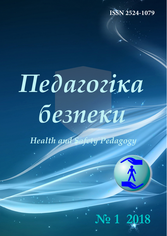Use of intellectual cardin the process of development of self-employed competence of future engineers
DOI:
https://doi.org/10.31649/2524-1079-2018-3-1-057-063Keywords:
innovative technologies, intelligence-maps, development of speech competence, English language, self-educational competenceAbstract
Polyculture, European integration processes, international and intercultural relations are impossible without English language proficiency. Its study, in the first place, depends on the ability of the individual to self-education, self-improvement and self-realization. At the present stage of development of education, the main task of teachers and scientists is to find modern approaches to the educational process, to create and implement new forms and methods of teaching that have the purpose, first of all, to stimulate the desire to study discipline. Unfortunately, so far, our students are convinced that the teacher should give them knowledge, rather than they have to make efforts to obtain from him and gain self-education skills during their studies in higher education institutions.
Study of foreign languages in higher technical education institutions is a prerequisite for the formation of the competitiveness of future specialists. As the research shows, for most of them (68%), the motivational factor for studying discipline is an assessment, not knowledge itself. Consequently, the motivational component of the level of studying by students of foreign languages is insufficient. Practical studies of modern forms and methods of training have allowed to allocate the method "Smart Card" as one of the most successful for use in the first year of training of future specialists in computer systems and automation. The main purpose of its use is to create a system of continuous speech, professionally directed competence, capacity for self, instilling the habit of renewal and deepening of communication skills in a foreign language in business communication training for students in higher technical education.
The concept of interactive technologies is analyzed, the importance and necessity of their use in the educational process of the higher school are revealed. The advantages of interactive learning and the main principles of the methodology of cooperation are described. A presentation of the "Smart Card" method, which is a stepping stone for the development of the language competence of a foreign language for future engineers as a necessary component of their self-education competence.
References
Biuzen, T. (2003). Supermysshlenye (2-e yzd.). Mynsk: Popurry.
Biuzen, T. (2004). Nauchyte sebia dumat. Mynsk: Popurry.
Buzan, Tony (2005). The Memory Book. ISBN 978-1-4066-44265.
Hlushok, L. M. (2010). Zastosuvannia interaktyvnykh metodiv pry vykladanni anhliiskoi movy u Khmelnytskii humanitarno-pedahohichnii akademii. Pedahohichnyi dyskurs, 8, 56-59.
Ozerian, O. Porady Toni Biuzena z tekhniky stvorennia mentalnykh kart. Retrieved from http://sonyah. blogspot.com/2011/11/blog-post_6964.html.
Pometun, O., & Pyrozhenko, L. (2002). Interaktyvni tekhnolohii navchannia: teoriia, praktyka, dosvid. Kyiv: A,P.N.
Rogers, E. (2003). Diffusion ofInnovations, 5th Edition. NY: Simonand Schuster.
Russian mind maps. Retrieved from www.yugzone.ru/../russian_mind_map.doc.
Selevko, H. K. (2006). Entsyklopedyia obrazovatelnykh tekhnolohyi (T. 1). Moskva: NYY shkolnykh tekhnolohyi.
Starieva, A. M. (2005). Interaktyvna tekhnolohiia navchannia studentiv u vyshchii shkoli. Naukovi pratsi. Pedahohichni nauky (T. 42), 29, s. 29-32.
Zhoholieva, N. V., & Baisara L. I. (2007). Psykholohiia vizualnoho myslennia ta zasoby yoho formuvannia pry navchanni. Retrieved from http://www.rusnauka.com/22_NIOBG_2007/Psihologia/25170.doc/htm.
Zubenko, O. V., & Medvedieva, S. O. Interaktyvni tekhnolohii navchannia pry vyvchenni inozemnykh mov v tekhnichnomu VNZ. Humanizm ta osvita: mizhnarodna naukovo-praktychna konferentsiia. Vinnytsia: Vinnytskyi natsionalnyi tekhnichnyi universytet. Vziato z https://conferences.vntu.edu.ua.
Downloads
-
PDF (Українська)
Downloads: 1414


